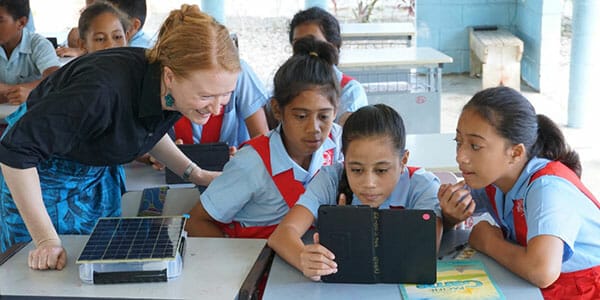SFIS Newsletter – August 2020
Return to the Newsletter Archive

ASU Peace Corps agreement to expand SolarSPELL learning platform’s reach
The Peace Corps and Arizona State University have signed a strategic agreement that will help Peace Corps volunteers in the field advance their humanitarian work by using an educational device invented by SFIS Associate Professor Laura Hosman. Under the memorandum of understanding, which was marked with a virtual celebration on July 10, Peace Corps volunteers will have wide latitude to use the SolarSPELL portable library. The solar-powered device has already been used informally by Peace Corps volunteers who serve in communities without internet service.

Empowering the community in marine policy
Katherine Ball, a Human and Social Dimensions of Science and Technology PhD student, is taking her passion for the ocean to Washington, D.C. She has been named a finalist for the 2021 class of the Sea Grant John A. Knauss Marine Policy Fellowship program. The fellowship places graduate students in federal government offices in Washington, where they will learn about and help shape national policy decisions affecting ocean, coastal and Great Lakes resources.

ASU researchers launch blog series exploring equitable research practices
As public attention has turned to systemic inequities in institutional cultures like those in police forces, medical care, school systems and food production, some researchers at Arizona State University are turning their attention to academic culture to explore how researchers might embody more equitable research practices. SFIS doctoral candidate Taylor Genovese has helped launch a new series, “Embodying Reciprocity: Relationality and Redistribution in Anthropology,” along with ASU postdoctoral scholar Schuyler Marquez and University of Chicago doctoral candidate Sonia Grant.

Who benefits from science?
Summer 2020 Issues in Science and Technology
Advancing science and technology without regard to outcomes—as a new $100 billion technology bill introduced in Congress proposes to do—is relatively straightforward. Advancing science and technology in a way that helps to address the knowledge and innovation needs of the nation is much more difficult. But that’s the sort of challenge that today’s civil and political unrest (and the legacy of neglect on which they build) indicate should be at the center of public investments in science and technology—and is the focus of many of the articles in the Summer 2020 Issues in Science and Technology.
Fall 2020 plans
ASU is preparing for the return to campus this fall. The university is taking several steps to ensure student, faculty and staff safety, including enhanced cleaning protocols, required face coverings and COVID-19 testing.
Research

Assistant Research Professor Michael Bernstein and co-authors have published “Improve Alignment of Research Policy and Societal Values” in Science, addressing the alignment of research policy and societal values.
Recognition

Kiki Jenkins, SFIS associate professor and Human and Social Dimensions of Science and Technology doctoral program chair, has been appointed to the COMPASS’ Leaders for Sea Change and SPLINE (STEMed Project Leaders Inclusivity NEtwork) programs.

Clinical Assistant Professor Faheem Hussain gave a presentation on Solidarity, Leadership, Negotiation, and ICT among the Rohingya Refugees in Bangladesh at the 2020 International Conference of Information and Communication Technologies on Development.

Assistant Professor Timiebi Aganaba-Jeanty presented in the recent Moon Dialogs Research Salon: “Safety Zones in Practice and Lessons from Earth,” where she discussed mission operator and international law perspectives on establishing safety zones on the lunar surface. She was also recently named as one of Arizona’s Greatest Storytellers.

Professor Katina Michael shared a personal story of her sister’s schizophrenia diagnosis, “Our Story of Schizophrenia,” and how her family stayed strong to provide love and support during the most challenging times
Alumni

Human and Social Dimensions of Science and Technology (HSD) alumni Nate Wade will co-lead COVID-19 Diagnostics Commons, an interactive hub for the global community to access information about testing options and share knowledge and practices for safely bringing employees back into the workplace during the COVID-19 era
.
Events
August 5: Public Interest Technology: A Leading Discussion
August 7: Digital Community Coffeehouse
August 10: Us in Flux: Conversations—Ernest Hogan and Frederick Luis Aldama
August 19: La Cohesión Social en Tiempos de Crisis/Social Cohesion in a Time of Crisis
August 20: Fall 2020 Semester Begins
Publications
Timiebi Aganaba-Jeanty
Safety Zones in Practice and Lessons from Earth
Moon Dialogs Research Salon
June 5, 2020
Laura Hosman and Martín Pérez Comisso
How do we understand “meaningful use” of the internet? Of divides, skills and socio-technical awareness
Journal of Information, Communication and Ethics in Society
June 13, 2020
Laura Hosman and Martín Pérez Comisso
Building online skills in off-line realities
First Monday
June 15, 2020
Nicholas Weller, Mahmud Farooque
Blinded by the Frontier
Issues in Science and Technology
June 17, 2020
Andrew Maynard
Notes on estimating personal risk of contracting COVID19 while attending class
therealandrewmaynard.com
June 29, 2020
Michael Bernstein
Improve alignment of research policy and societal values
Science
July 3, 2020
Katina Michael
Our Story of Schizophrenia
Transformations
July 29, 2020
Erik Johnston, Margaret M. Hinrichs and Jieshu Wang
For Impactful Community Engagement: Check Your Role
Communications of the ACM (Association for Computing Machinery)
July 2020
Erik Fisher
Governing Technoscience in Society: Tracing the Dialectics of Enthusiasm, Ambivalence, and Adjustment
TechnoScienceSociety
In the Media
Timiebi Aganaba-Jeanty
The Experts Speak: An Interview with Timiebi Aganaba-Jeanty, PhD
New Space
June 12, 2020
Timiebi Aganaba-Jeanty
Arizona’s Greatest Storytellers
Quilted
June 16, 2020
Brian David Johnson
Cybersecurity in 10 years: How to protect against all the possibilities
Mastercard Newsroom
January 5, 2021
AKatina Michael
Concern over the increasing use of facial recognition in CCTV cameras
Australian Broadcasting Corporation
June 17, 2020
Heather Ross and Anna Muldoon
A day in the life of a contact tracer
The Lily
June 29, 2020
Brian David Johnson
‘Sentient’ homes and ‘intelligent’ food could feature in the lives of our children 30 years from now: Futurist taps into kids’ imaginations to predict ‘what’s next’ for society
Daily Mail
July 23, 2020